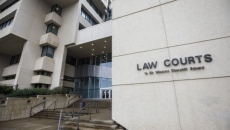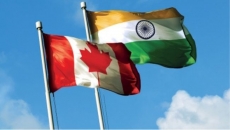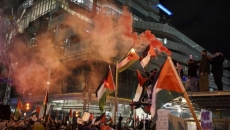Prime Minister Justin Trudeau said Thursday that Canada is working with allies to determine "exactly what happened" in the blast at a hospital in Gaza City earlier this week that has become a flashpoint in the Israel-Hamas war.
I sat down with Israel’s Ambassador to Canada, @MoedIddo, earlier today. I expressed Canada’s support for Israel’s right to defend itself in accordance with international law – and our sincere condolences for those killed in Hamas’ unconscionable terror attack. 🇨🇦🇮🇱 pic.twitter.com/9kEfgbA2X7
— Bill Blair (@BillBlair) October 19, 2023
Trudeau said at a news conference in Ottawa that Canada is taking the "necessary time" to probe a blast that the Hamas-controlled Gaza Health Ministry says left hundreds dead.
Hamas is blaming the Israeli military for the blast, but Israel has denied any involvement, saying it has images that it says show a Palestinian militant group misfired on the hospital.
Pressure began to mount on Trudeau to clarify which side he thinks is responsible after United States President Joe Biden told Israeli Prime Minister Benjamin Netanyahu during his visit to the region on Wednesday that it appeared the hospital blast was perpetrated "by the other team, not you."
Trudeau had said when news of the blast first emerged that what happened was "unacceptable" and "not legal" under the international laws that govern war.
"The thing with this horrific situation in the Middle East is it is not just happening over there," he said at a press conference Thursday wrapping up a summit with Caribbean leaders.
"It's having an impact, a deep, direct, personal impact, on individuals, on families, on communities here in Canada."
The prime minister went on to say that everyone can agree that the deaths of innocent civilians at the hospital in Gaza "never should have happened."
"But we are taking the necessary time to look carefully at everything, and rapidly, of course, before we draw any final conclusions about what happened."
The latest conflict began when Hamas, which Canada has deemed a terrorist entity for more than 20 years, conducted surprise attacks on Israeli citizens on Oct. 7. Israel declared war in response and has been raining airstrikes on the Hamas-controlled Gaza Strip.
The Gaza Health Ministry says nearly 3,800 people have been killed in Gaza since the war began, while more than 1,400 people in Israel are dead, most of them civilians caught up in the deadly Hamas incursion that began the conflict.
Canadian officials are still working to try and find a way to get upwards of 400 Canadians and their families out of the Gaza Strip, which is blockaded at its two land borders with Israel and Egypt.
Israel announced during Biden's visit that it approved a plan that would allow Egypt to deliver some supplies into Gaza, which is home to more than two million people.
Even before the latest war broke out, the Gaza Strip was one of the most densely populated and impoverished regions in the world. International aid organizations have warned that the region is close to collapse as Israel has cut of access to its electricity, fuel and food.
Hundreds of thousands of Palestinians have been displaced in Israel's campaign of retaliation. The Israeli military issued an evacuation order for a million people, telling them to leave their homes in the territory's north and head south towards the Egyptian border as Israel prepares a ground offensive.
Global Affairs Canada says that so far, around 1,400 Canadians, permanent residents and their families have been taken out of Israel on Canadian-arranged flights from Tel Aviv to Athens.
And Ottawa says that over the past two days, it has arranged for 12 more Canadians in the West Bank to be bussed to neighboring Jordan.
While officials continue to get Canadians out of Israel and the West Bank — which Israel has occupied since 1967 and where it has established numerous settlements — the government is warning Canadians to avoid all travel to neighbouring Lebanon. It is asking those in the country to leave while commercials flights remain available.
Canada and its allies remain concerned that the Israel-Hamas war could expand regionally, a fear underscored by clashes happening between Hezbollah and the Israeli military across Israel's northern border with Lebanon.






